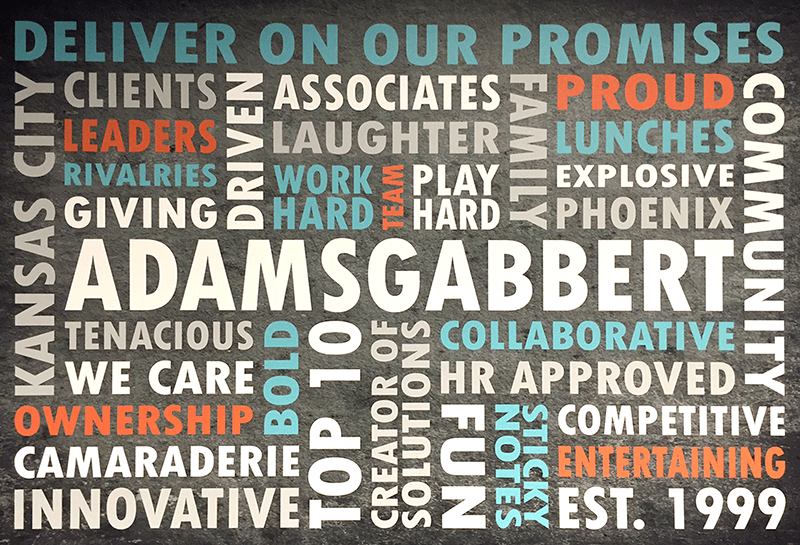On average, an employee spends 40 hours per week at work. That’s 40 hours of shared space; forty hours of meetings, client calls, lunch breaks and time spent collaborating with co-workers.
So, there’s something to be said about the relationships you develop at work. A company’s culture is entirely unique and entirely what you make of it, but it should be clearly defined.
Our culture was built to reflect our values and reward the passion and power of our people. I’m inspired by their dedication and commitment to our mission, and that’s directly reflected in the company’s rapid growth; our people are the reason for our success.

AdamsGabbert’s employee-designed culture board.
Mark Miller, vice president of marketing at Emergenetics International, highlights the importance of being up front about your company’s culture and how it can help you get the right hires through the door:
“Conveying company values, being clear on your mission and finding creative ways to demonstrate your uniqueness and how it relates to your workforce can create a baseline of trust. The company culture needs to be driven by the top leadership and reinforced within the norms of the way people behave, communicate and interact.”
Improved Performance and Engagement
A strong culture typically leads to improved results when compared to companies with weaker cultures. Employees are motivated to get to work. They’re engaged, which is associated with feeling valued, secure, supported and respected.
A study by the Queens School of Business and the Gallup Organization revealed organizations with low employee engagement scores experienced 18 percent lower productivity, 16 percent lower profitability, 37 percent lower job growth and 65 percent lower share price over time.
However, a culture in which employees feel respected and valued by both their superiors and their peers causes a ripple effect, beginning with personal satisfaction that leads to improved performance and engagement, and ultimately company growth.
Employee Retention
When your employees feel engaged and connected to their work and the company they work for, they’re less likely to seek employment elsewhere. Work relationships often blossom into friendships, promoting an environment of support, respect, sociability and a sense of belonging that employees look forward to being a part of.
But I always make sure to mention there’s no one best culture, so don’t stretch yourself thin trying to be something for everybody. Different employees are attracted to different cultures, just like people are attracted to different music, hairstyles, movies, etc. The key is bringing employees on board who mesh well with your company’s culture, mission and vision for the future. After all, if your employees believe in them, trust me, they’ll want to stick around.
At AdamsGabbert, we work hard and play hard together. Employees often take time off for important personal events, and they’re able to make up that time later. We all roll up our sleeves to help multiple not-for-profit organizations during business hours and personal time. Each culture is unique, and this is the culture that works for us.
Finding the Right Fit
When it comes to staffing and recruiting, our first priority has always been matching the talent to the client’s needs and culture. And because one size doesn’t fit all, we understand that qualified does not always mean compatible. We believe you can have a great company, a great person, but that doesn’t automatically mean a great fit. For us, finding the right fit makes all the difference.
There’s important work to be done throughout the interview process that can help you better identify candidates that are not only qualified, but are also a strong fit within your company’s culture; and we’ve seen success stories time and time again from our clients that support this theory.
Your culture is your company’s pulse. It breathes life into your organization and builds relationships and camaraderie amongst co-workers. Pay attention to your culture; find employees who are compatible and believe in it; nurture it and help it grow. It can make all the difference.
Denise Kruse is the CEO and owner of AdamsGabbert (AG), a catalyst for growth, a spark for innovation, and a facilitator of progress. Founded in 1999 and based in Overland Park, Kan., AG focuses on staffing + recruiting, technology services, and consulting—all designed to make business better for their clients. Share your thoughts on LinkedIn, Facebook or Twitter!



